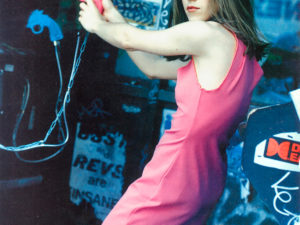Liz Phair’s explicit lyrics and girlish voice are a startling combination
Liz Phair, veteran of a mere one album, is already tired of rock stardom. Here she is, a Midwesterner, staunchly middle-class, 25-years-old and gifted with a good voice and a sly, ingenious way with the classic pop song, and she’s already feeling a little burned out and worn down by cult acclaim.
Eighteen months ago, nobody had heard of her. Despite years of DIY songwriting and scratchy home demos, nothing had clicked until Matador, one of the more respected labels on the American indie-rock frontier, heard one of her tapes. Out of that came the hometown classic Exile in Guyville, a notebook on rock songwriting that transcends its low-fi origins and stands tall in the light of Phair’s crisp, startling words and images.
While the record was conceived as a kind of bastard offspring of The Rolling Stones’ Exile on Main Street, down to its number of tracks and segmented flow, Phair isn’t competing with that slovenly masterpiece: she’s countering it. Her strongest melodies are as vibrant as the best of the Byrds, but it’s all hosed down with a punky tone of delivery that scrubs through the guitars, drums and taped noise that surround here. She has a disarmingly sweet and girlish voice that makes her more graphic lyrics all the more unsettling: two that get quoted all the time are, “I want to be your blow job queen” and “I want to fuck you like a dog.”
“I write to turn phrases,” she says. “I don’t know if people want to quote them. You’re always worried about what people want to say. I’m not sure if you can account for people’s tastes, but I try to.”
The record must seem ancient to her now and her second album is almost completed. “There’s a theme, but it’s hard to say what it is at this point. It’s like I’m swapping roles all the time, between men and women. As I was working my story out, I kept choosing these songs they were either playing a traditional female or male role.”
Even though short tours have been mooted, it’s hard to hear Phair’s music outside a studio, just as it was difficult to imagine Their Satanic Majesties reproducing the pristine murk that made Exile such a doltish triumph. Exile in Guyville is more a collection of splinters — chips from a worldview that present one woman’s view of sex, lust, affection and wistfulness — and the rush by some observers to plant Phair in the vanguard of New Rock Women is tiresomely opportunist.
“My reputation is devouring who I really am,” she sighs, “and the charm of what I’m doing, which is relatively down home. I come from the DIY thing. People keep saying how I’m speaking for all women now. I’m not. I’m speaking for myself.”
With performers from Polly Harvey to Sinead O’Connor pressed into service as some kind of standard-bearers, it’s tempting to lump Phair in with the class perceived as rock’s predatory women. Better, though, to hear her as a maverick singleton voice: funny, sharp, lonesome. Asked to provide a signpost, she says: “Listen for the songs. Look past the noise. Imagine yourself writing them. Pretty soon, you’ll click into my groove.”
Liz Phair’s second album will be out later this year.
By Richard Cook
GQ (UK), July 1994






